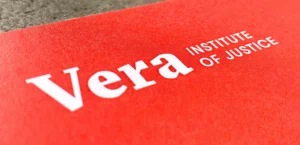The Vera Institute of Justice is a nonprofit organization focused on criminal justice reform, working to create a fairer, more humane justice system. Established in 1961, Vera has been at the forefront of advocating for systemic changes in the criminal justice system, including addressing issues like mass incarceration, racial disparities, and unequal access to justice. This blog post delves into the Vera Institute of Justice’s mission, key initiatives, and the impact it has had on policy and practice in the United States.
1. What is the Vera Institute of Justice?
The Vera Institute of Justice is a national organization committed to transforming the U.S. criminal justice system. It works with government agencies, community organizations, and other stakeholders to develop and implement practical solutions that reduce incarceration, promote fairness, and ensure that all individuals are treated with dignity. The Institute is known for its data-driven approach, focusing on research, policy analysis, and advocacy to support evidence-based criminal justice reforms.
Vera’s work spans across several key areas, including pretrial justice, jail reform, sentencing, and support for marginalized communities. The organization combines research with advocacy to challenge policies and practices that contribute to inequality and unjust treatment of individuals within the justice system. Through partnerships and collaborations, Vera seeks to create a more equitable and effective justice system that benefits both individuals and communities.
2. What are the key initiatives of the Vera Institute of Justice?
The Vera Institute of Justice runs several key initiatives aimed at improving different aspects of the criminal justice system. One of the Institute’s most prominent initiatives is its work in pretrial justice. Vera advocates for eliminating the use of money bail, which disproportionately impacts low-income individuals, especially people of color. Instead, Vera promotes alternatives to cash bail, such as risk assessments and community-based programs, to ensure individuals are not incarcerated simply because they cannot afford to pay bail.
Another significant initiative is ending mass incarceration. Vera supports efforts to reduce the overall prison population by challenging harsh sentencing laws and advocating for the decarceration of low-level offenses. The organization also promotes reentry programs for individuals exiting the justice system, ensuring they have the support they need to reintegrate into society and reduce recidivism rates.
3. How does the Vera Institute of Justice advocate for racial equity in criminal justice?
Racial equity is a core focus of the Vera Institute of Justice. The organization works to dismantle policies and practices that disproportionately affect people of color, particularly Black and Latinx individuals. Vera’s research has shown that people of color are more likely to be arrested, incarcerated, and receive harsher sentences compared to their white counterparts, even for similar offenses.
To address this, Vera advocates for changes in policing, sentencing, and incarceration practices. The Institute’s work includes developing policies that promote alternatives to arrest, such as community-based programs that address underlying issues like mental health and substance abuse. By working to eliminate racial bias in the justice system, Vera seeks to create a more just and equitable environment for all individuals, regardless of their race or background.
4. How does Vera’s research contribute to criminal justice reform?
The Vera Institute of Justice is known for its rigorous research and data-driven approach to criminal justice reform. Through extensive studies and analysis, Vera identifies systemic issues and provides evidence-based solutions to improve the justice system. This research informs advocacy efforts and helps policymakers make informed decisions about reform.
For example, Vera’s studies on pretrial detention have highlighted the negative consequences of pretrial incarceration, such as increased risk of conviction and longer sentences. Vera’s research also explores the effectiveness of diversion programs and the importance of community-based alternatives to incarceration. This research is not only used by Vera itself but also shared with other organizations, government agencies, and policymakers to drive meaningful change in the justice system.
5. What role does the Vera Institute play in advocacy and policy change?
The Vera Institute of Justice plays a critical role in advocating for policy change at the local, state, and national levels. Through direct advocacy, the Institute works with lawmakers and government officials to pass legislation that supports criminal justice reform. Vera also works with community organizations to raise awareness about key issues, mobilize grassroots support, and encourage public engagement on justice reform.
One of Vera’s key policy areas is bail reform. The organization has worked to challenge and change bail practices that disproportionately affect low-income individuals, often resulting in unnecessary incarceration before trial. Vera’s advocacy efforts have led to changes in laws in several states, with a growing number of jurisdictions adopting policies that move away from money bail toward risk-based systems.
6. What success stories have emerged from the Vera Institute’s initiatives?
The Vera Institute of Justice has a long track record of successful initiatives that have led to significant changes in the criminal justice system. One of the most notable successes has been its work in reducing pretrial detention. In several cities, Vera has helped implement systems that assess individuals for pretrial release based on their risk to public safety, rather than their ability to pay bail. This has resulted in a reduction in the number of people incarcerated before trial, particularly among low-income individuals and people of color.
Additionally, Vera has been instrumental in reforming the New York City jail system, working with local government and advocacy groups to improve conditions and reduce the use of solitary confinement. Through these efforts, Vera has made a lasting impact on the lives of incarcerated individuals and has helped create safer, more rehabilitative environments within correctional facilities.
7. How can you support the work of the Vera Institute of Justice?
There are various ways individuals can support the Vera Institute of Justice and its mission. One of the most impactful ways to support Vera’s work is by donating. Contributions help fund the Institute’s programs and initiatives, allowing them to continue their efforts to advocate for criminal justice reform and provide resources to communities in need.
Additionally, individuals can get involved by spreading awareness about Vera’s work, engaging in conversations around criminal justice reform, and supporting local and national policy changes that align with Vera’s mission. Whether through direct action, advocacy, or financial support, there are numerous ways to join Vera in creating a more equitable and fair justice system.
For more details click here.
Conclusion
The Vera Institute of Justice is a leading organization in the fight for criminal justice reform. Through its advocacy, research, and community partnerships, Vera is working to create a more fair, equitable, and humane justice system that benefits everyone. The Institute’s focus on reducing mass incarceration, addressing racial disparities, and promoting alternatives to incarceration has led to lasting changes in the criminal justice system, and its impact will continue to be felt for years to come.












